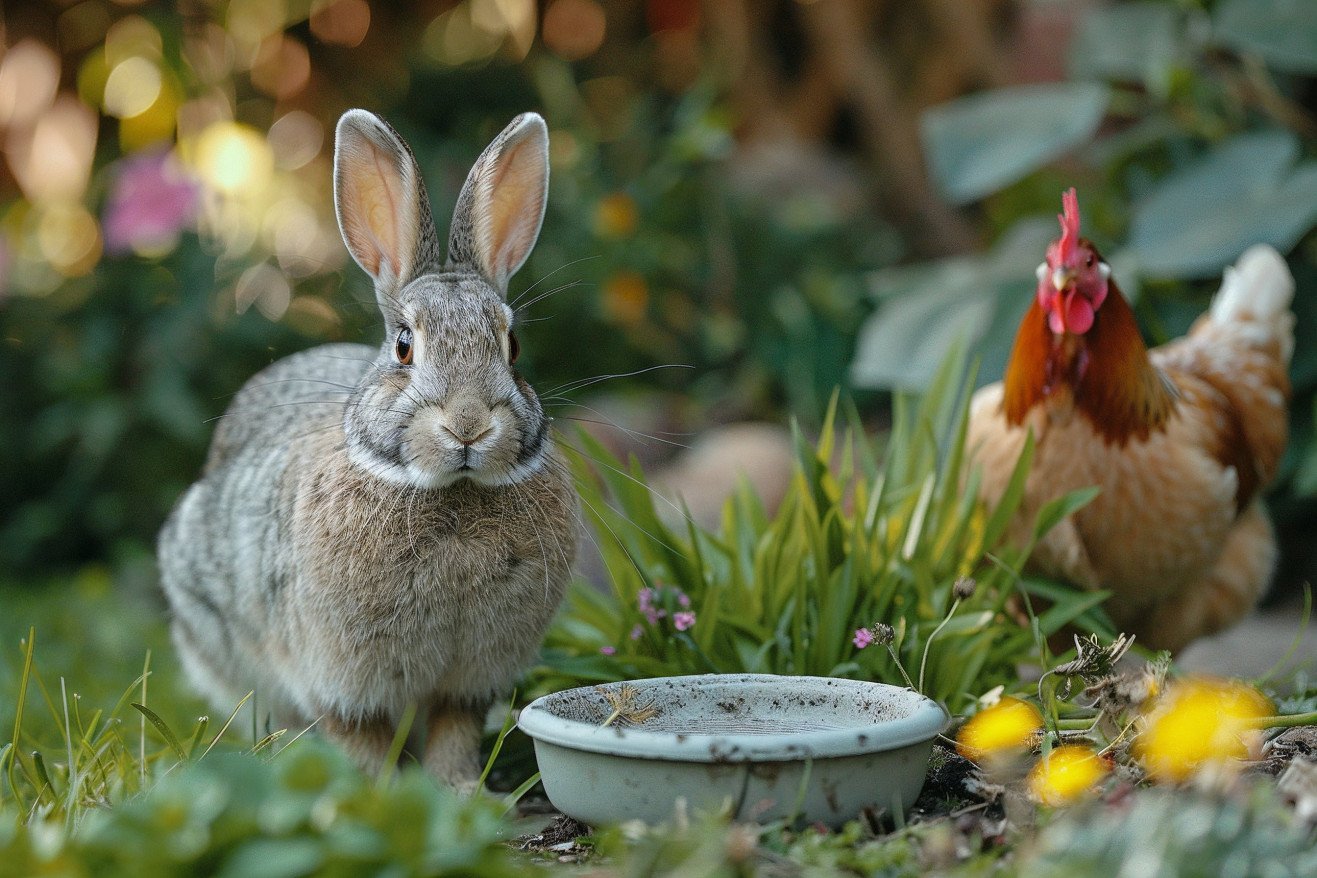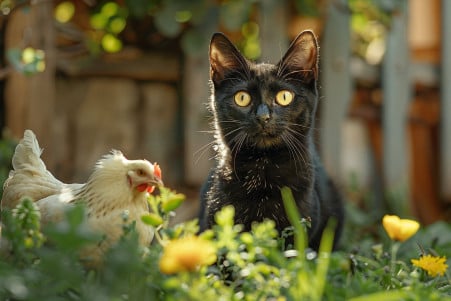Can You Keep Rabbits and Chickens Together? What to Know
9 May 2024 • Updated 8 May 2024

Although rabbits and chickens can live together under the right circumstances, there are several things to consider in order to ensure the safety, health, and happiness of both animals. Rabbits and chickens have different needs when it comes to housing, diet, and socialization, so it will require some planning and careful attention to detail to keep them together successfully. If you take the necessary precautions, they can be good companions - but they are also often referred to as a hard-to-keep mixed species pair.
We will explore studies from animal behaviorists, veterinarians, and experienced pet owners that look at the potential pitfalls and best practices of keeping rabbits and chickens together. This research will help you understand how compatible the two species are, what you may need to do to help them live together, and how to introduce them in a way that will help them get along. This information will help you decide if keeping rabbits and chickens together is the best choice for you.
Can rabbits and chickens live together?
Health and Safety
There are many health and safety concerns that come with introducing rabbits and chickens. Chickens are omnivores and may view baby rabbits as prey, which can lead to injuries. Rabbits may also attempt to mount chickens, which can be harmful to both animals.
Disease transmission is another issue that comes with co-housing rabbits and chickens. Bacterial diseases like salmonella, pasteurella multocida, and streptococcosis can be transmitted through direct contact or shared living spaces. In addition, parasites like fleas, lice, and mites can be transmitted between rabbits and chickens.
To reduce the chances of these issues, it’s important to make sure that the animals are housed in separate areas, to introduce them when they are young, and to make sure that rabbits are spayed or neutered. It’s also important to make sure that the animals are kept in clean environments. It’s important to supervise the animals closely, especially when they are first introduced and when they are living together, as chickens may become aggressive and there may be no way for rabbits to get away. While owners can take steps to make sure that their animals are safe and healthy, the fact that these animals are so difficult to co-house means that it’s likely best to keep them in separate living environments.
Ideal Housing and Enclosure Setup
Rabbits and chickens need similar amounts of space and similar temperatures, but they have different sleeping and nesting habits. According to Omlet Blog US, "Chickens will roost overnight, while rabbits will seek shelter at ground level." This means that separate, secure housing areas should be set up for each species within the shared space.
Rabbits need a clean, private space to retreat to, while chickens need roosting areas and nesting boxes. Proper ventilation, predator protection, and safe flooring materials that won't harm rabbits' delicate skin are essential. Gradual introduction and acclimation to the shared living quarters, especially when young, can help the animals adapt according to Backyard Chickens.
With the right housing and a slow, careful introduction process, rabbits and chickens can live together. However, the need for separate housing areas and the need for careful acclimation make it clear that co-housing rabbits and chickens can be challenging.
Feeding and Nutritional Needs
Rabbits and chickens have different dietary needs and should be kept separate to avoid potential health problems. Per Backyard Chickens, rabbits need a high-fiber diet, which should mainly consist of hay, fresh vegetables, and a small amount of pellets. Chickens, on the other hand, can eat a more diverse range of foods, including grains, insects, and table scraps. However, their feed should be kept separate from rabbits, as Backyard Chickens notes that rabbits can be attracted to chicken feed, which can cause digestive issues and obesity.
Separate feeding stations and making sure that both animals have access to their specific diets are important for their health. According to the Omlet Blog US, "To prevent this, make sure your chicken feeders are out of reach of your rabbits, and that your rabbits are fed inside of their hutch, or in a separate area that they can access via Zippi Rabbit Tunnels, which are not accessible by most chickens." By making sure that their dietary needs are met, owners can ensure that both rabbits and chickens will be healthy and happy when living together.
Choosing the Right Breeds and Introducing Them Properly
There are certain rabbit and chicken breeds that may be more likely to get along based on their size and temperament. The Chicken Bawks suggests that smaller, less aggressive rabbit breeds like Mini Rex or Mini Lop are more likely to be accepted by chickens. Introducing the animals when they are young can also help them accept one another and reduce the likelihood of one animal asserting dominance.
The RSPCA suggests a step-by-step introduction process that begins with the animals living in enclosures next to each other so that they can get used to one another's presence from a safe distance. Close supervision of the animals' first interactions and gradually increasing the time they spend together can help ensure that the animals will bond successfully. This method will help the animals get used to each other before they are forced to live together full-time.
While choosing the right breeds and introducing the animals properly may help some rabbit and chicken owners successfully house the animals together, the need for special accommodations and close supervision makes it clear that it's not easy. It will be important for anyone who is considering keeping rabbits and chickens together to carefully consider the pros and cons.
Pros and Cons of Keeping Rabbits and Chickens Together
Rabbits and chickens can offer a range of benefits when kept together on a small farm or homestead. Hobby Farms explains that rabbits can be kept for their fiber, manure, or as pets/show animals. Their manure is a valuable organic fertilizer that can be directly added to gardens. Chickens, meanwhile, are a consistent source of eggs and meat. Keeping the two species together can help reduce the costs and space needed to keep them separately.
That said, the costs of setting up and maintaining a shared space for rabbits and chickens can be higher. Rabbit Smarties points out that both species can be expensive to get started with. There are also potential issues with managing their different behaviors, as Backyard Chicken Coops cautions that rabbits may try to mount chickens, and preventing unwanted breeding. It's also important to make sure that the risk of disease transmission, which is mentioned by Mom.com, is minimized.
That said, with careful consideration and consistent attention, the benefits of keeping rabbits and chickens together may make it worthwhile for some homesteaders. As Homesteading Suburbia explains, while it's definitely possible to keep rabbits and chickens together, owners need to make sure they have the space to keep them apart if necessary.
Conclusion: How to Make an Informed Decision
While it can be done, keeping rabbits and chickens together successfully will take a lot of work, a specific setup, and constant attention. From proper housing to slow introductions, there are many factors that will go into keeping both animals safe and healthy. From their diets to the breeds you choose, there are many things to think about before you decide to keep rabbits and chickens together.
However, with the right work and dedication, some homesteaders and pet owners may find that the benefits of keeping rabbits and chickens together are worth it. That said, it’s important to make sure that you have the time, energy, and resources to make it work before you decide to keep rabbits and chickens together.


